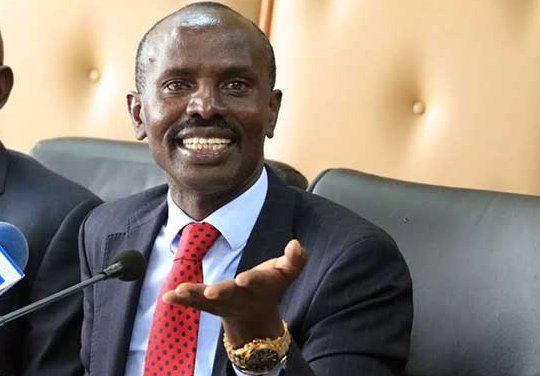The Teachers Service Commission, TSC, has moved to set the record straight concerning its relationship with teachers’ unions. In what is seen as a direct response to the Kenya National Union of Teachers’, KNUT, aasertion that the TSC wants to cripple its operations, TSC now says it has no powers to deregister any trade union.
Here is the presser from the TSC boss, Dr. Nancy Njeri Macharia;
‘STATEMENT ON TEACHERS SERVICE COMMISSION’S RELATIONSHIP WITH TEACHERS’UNIONS
The Teachers Service Commission (TSC) wishes to set the record straight in regard to its relationship with the Teachers’ Unions and state as follow:
TSC as a Corporate Entity
As a corporate entity and as provided under the law. TSC executes its mandate through the Board led by the Commission Chairperson, Dr Lydia Nzomo. The Commission is supported by a Secretariat headed by the Secretary/Chief Executive Officer who is charged with the duty of implementing Board decisions.
As a public institution, the Commission remains committed to supporting the Government in the realization of its development agenda through the provision of quality education. Over the last two years, the Commission has recruited an additional 18,700 teachers to support the policy of 100 percent transition of learners to secondary schools. In addition, to several other key milestones, TSC has fully expedited the processing of pension claims and automated its payroll system, including the management of all third-party deductions.
The Commission was recently feted by the African Union (AU) for the Third Party Transaction Management System (T-PAY). This is an innovative IT platform that allows teachers to manage their third-party deductions, including union dues and financial transactions against their pay. The TSC win was under the category of Best Ethical Managed, Accountable, Transparent and Accessible organization. T-PAY has greatly improved our service delivery to teachers who can now manage all their third-party transactions at the click of a button, while preserving their right to data privacy. As a direct corollary, this has enhanced contact hours between teachers and learners, consequently improving learning outcomes.
To ensure that teachers are adequately prepared to successfully implement the Competence Based Curriculum (CBC). TSC has trained a total of 159,810 teachers during this year. (some 91,620 in April and 68.490 in August). A further 68.490 are scheduled to be trained in December, bringing the total to 288,000 by the end of 2019. As we come to the close of the year, we wish to thank our teachers for their dedicated and selfless service to the nation. We assure them of our commitment to serve and support them.
Relationship with Teachers’ Unions
TSC recognizes teachers’ unions as key stakeholders in the teaching service and the critical role they play in representing teachers’ issues.
Initially, TSC had an unstructured relationship with the unions. It is not until June 2016, that TSC. under the current leadership,made a fundamental decision to sign Collective Bargaining Agreements (CBAS) with teachers’unions. TSC and the recognised teachers’unions signed the first CBA, covering the period 2013-2017 in June 2016. In October, 2016, the TSC and the unions signed a second CBA covering the period July 1, 2017 to June 30, 2021, through which the Government committed Sh54billion in improved salaries and allowances for teachers.
The overall objective of the CBAs was to promoteindustrial harmony and constructive social dialogue in the teaching sector. The culture of industrial unrest that had dominated the teaching service has now been conclusively addressed, thanks to the partnership of teachers and the TSC leadership to address teachers’ issues in a structured and regulated manner. This has led to improved quality teaching for our children on whose behalf we have all been called to serve
In its engagement with the unions, TSC operates strictly within the legal provisions that guide such a relationship. Any action initiated by the Commission is done after careful thought, review, in good faith and in strict conformity with the law. We wish to clarify that under the law. TSC has no power to register or de-register a union as that is the exclusive mandate of the Registrar of Trade Unions.
Similarly, under the law, to sustain a Recognition Agreement between an employer and a union, there are certain minimum requirements that a union must meet. However, in the event a union fails to meet the statutory threshold, the employer will continue to remit all dues payable to such a union.
The Commission has continued to work with registered unions even without a recognition agreement. Further, the process leading to revocation of a Recognition Agreement is elaborate and intricate.
It starts with issuance of the notice of intention and culminates with the decision reached by the National Labour Board. Parties involved still have an opportunity for conciliation and ultimately, judicial adjudication. This process is succinctly provided for by the law. Accordingly, the narrative being advanced that the Commission intends to kill any union is not only false but also misleading
Conclusion
Finally, the Commission wishes to assure all teachers that it absolutely has no desire or interest to constrict their avenues for expression and right to union representation. Equally, the Commission will continue to work harmoniously with all registered trade unions operating within the teaching service.’
Also read:
-
- All TSC services online portals and how to log in
- TSC TPAD data upload deadline
- Complete guide to the new TSC TPAD portal
- TSC: Full details on the newly established grades for teachers
- TSC: Designation codes for all teacher job groups
- TSC Grades and qualifications/ requirements for various administrative positions in schools
- TSC: Details on the current all 36 Teacher job groups/ grades
- TSC: Requirements, appointment and responsibilities of Principals
- All what you need to know and carry to a TSC teacher recruitment interview
- TSC: Requirements, responsibilities and appointment of De
